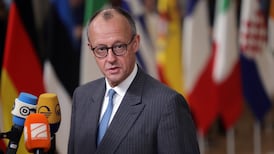Eight years after Germany’s chancellor Angela Merkel responded to a historic migration crisis with an open-door approach and “we can do this” refrain, her successor Olaf Scholz has begun a controversial pivot towards a more restrictive migration policy.
As a 70 per cent spike in arrivals triggers public unrest and a regional political revolt, the Scholz administration has agreed to tighten migration rules and benefits, while increasing payments to local authorities who accommodate new arrivals.
After a high-stakes 17-hour meeting with regional leaders, a bleary-eyed Mr Scholz emerged at 2am on Tuesday to present a 10-point paper that insists the reforms will guarantee “humanity and order”.
“Given the undeniable pressures over the undeniably large numbers of arrivals,” he said, “it was possible for all levels of this state to work together closely.”
READ MORE
Germany’s second migration wave – coming on top of one million Ukrainian arrivals – has tested a problematic division of German competences. This gives 16 federal states, their cities and municipalities frontline responsibility for feeding, housing and schooling new arrivals. But the federal government in Berlin steers migration policy and its financing. For months regional leaders and mayors have complained that payments from Berlin have not kept pace with the surge in numbers.
To help meet the growing financial shortfall, Berlin will boost per-head payments by a third to €7,500 annually, but hopes additional measures will see a drop overall in arrivals.
[ Refugee groups accuse Germany of ‘pandering to populists’ with deportation rulesOpens in new window ]
As well as plans to expedite deportations of irregular migrants and arrivals from countries with a low acceptance rate, asylum applicants will have to wait three years – twice as long as before – for full welfare entitlements.
In addition, daily food and accommodation allowances will be paid out via electronic voucher cards instead of in cash, to prevent arrivals sending money back to family at home. Finally, Berlin has agreed to examine demands from the opposition Christian Democratic Union to begin offshore processing of migrations.
After a few hours of sleep, Mr Scholz began the work of convincing his coalition partners of the necessity – and efficacy – of the proposals.
Senior Green leaders have already conceded that “when capacities reach their limits, as at present, the numbers have to drop”, prompting blowback from leftist rank-and-file and some the Bundestag parliamentary party members.
Green Bundestag migration spokesman Julian Pahlke said no migration surveys indicated welfare payments were the main draw for arrivals and that the only certainty of the new plans was an increase in social tensions by “letting asylum seekers live in poverty”.
German regional representatives were more optimistic that news of the welfare cuts would spread back down migration routes.
“The numbers won’t just drop overnight because the federal government and states have decided something,” said Gerd Landsberg, head of a lobby group for municipalities, “but this could have a long-term effect if it is implemented consequentially.”
Berlin officials sent mixed signals on Tuesday over whether relocating asylum applicants for processing in a third country is legal under German law.
The UK and Denmark are examining such plans with Rwanda and, on Tuesday, Italy announced two migration centres to hold 36,000 people in northwest Albania.














